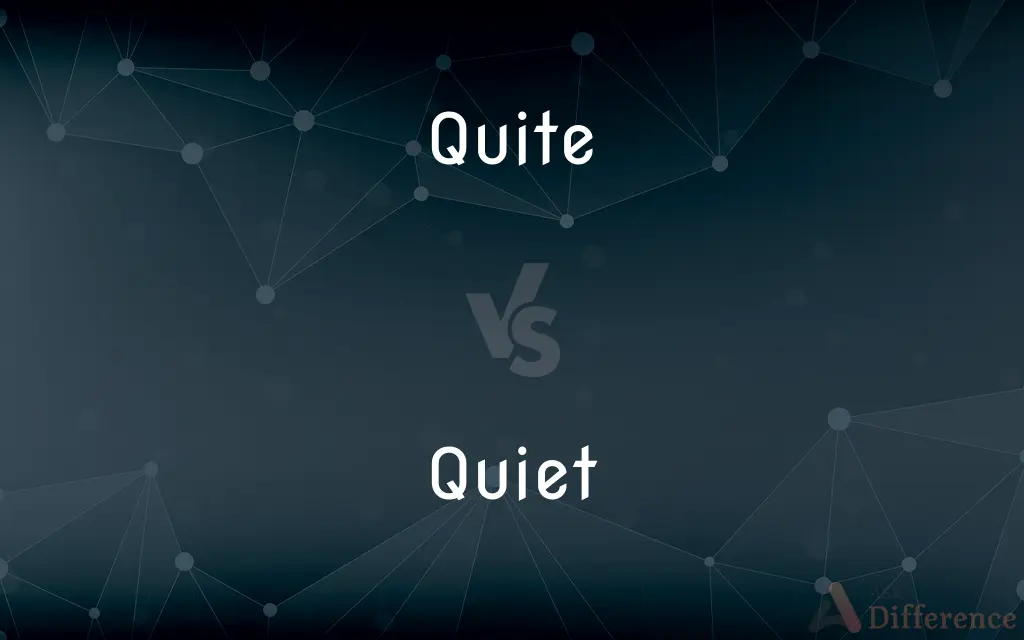Quite vs. Quiet — What's the Difference?
By Tayyaba Rehman — Updated on October 12, 2023
"Quite" is an adverb meaning "completely" or "to a degree," while "Quiet" refers to the absence or low level of noise or disturbance.

Difference Between Quite and Quiet
Table of Contents
ADVERTISEMENT
Key Differences
"Quite" is an adverb commonly used in English to emphasize or modify an adjective or adverb. For instance, saying "quite interesting" implies something is more interesting than just being described as "interesting." On the other hand, "Quiet" is an adjective used to describe something with a low level of noise or disturbance, as in a "quiet room."
When someone says "It's quite cold," they are emphasizing the degree of coldness, possibly more than expected. Conversely, if someone mentions a "quiet winter night," they are describing a serene and noiseless ambiance, typical of a snowy evening.
"Quite" can sometimes denote a level of uncertainty. For example, "It's quite good" might mean it's good, but not outstanding. "Quiet," on the other hand, is unequivocal and indicates a clear lack of noise or disturbance, like in a "quiet library."
"Quite" also has the meaning of "completely" or "wholly," like when someone says, "I'm quite certain." Meanwhile, "Quiet" can be used as a command or request to ask someone to lower their noise level, as in "Please be quiet."
Both words, "Quite" and "Quiet," although close in spelling, serve different purposes in the language. "Quite" is versatile and often works to intensify or lessen the degree of another word. In contrast, "Quiet" consistently relates to the concept of silence or minimal disturbance.
ADVERTISEMENT
Comparison Chart
Part of Speech
Adverb
Adjective (mostly)
Primary Use
To emphasize or modify
To describe low noise or disturbance
Meaning Variation
Can mean "completely" or "to a degree"
Absence of noise
Command Context
Not typically used as a command
"Be quiet!" (requesting silence)
Related Concepts
Intensity, certainty, degree
Silence, stillness, peace
Compare with Definitions
Quite
To a certain degree.
The movie was quite entertaining.
Quiet
Having little noise.
The forest was eerily quiet.
Quite
Completely or wholly.
I'm quite sure of my decision.
Quiet
Free from public attention.
They led a quiet life in the countryside.
Quite
Emphasizing agreement.
That's quite right!
Quiet
Making little or no noise
I was as quiet as I could be, but he knew I was there
The car has a quiet, economical engine
Quite
To the utmost or most absolute extent or degree; absolutely; completely
I quite agree
Quite frankly, I don't blame you
Are you quite certain about this?
It's quite out of the question
This is quite a different problem
Quiet
Carried out discreetly, secretly, or with moderation
We wanted a quiet wedding
I'll have a quiet word with him
Quite
To a certain or fairly significant extent or degree; fairly
He's quite an attractive man
It's quite warm outside
Quiet
Absence of noise or bustle; silence; calm
The ringing of the telephone shattered the early morning quiet
Quite
Expressing agreement with or understanding of a remark or statement
‘I don't want to talk about that now.’ ‘Quite’
Quiet
Make or become silent, calm, or still
The journalists quieted down as Judy stepped on to the dais
There are ways of quieting kids down
Quite
To the greatest extent; completely
Quite alone.
Not quite finished. See Usage Note at perfect.
Quiet
Making or characterized by little or no noise
A quiet library.
A quiet street.
A quiet, well tuned engine.
Quite
Actually; really
I'm quite positive about it.
Quiet
Free of turmoil and agitation; calm
A quiet lake.
A quiet place in the country.
Quite
To a degree; rather
Quite soon.
Quite tasty.
Quiet
Providing or allowing relaxation; restful; soothing
A quiet afternoon nap.
A quiet tune on the flute.
Quite
To the greatest extent or degree; completely, entirely.
Quiet
Not showy or bright; subdued
A room decorated in quiet colors.
Quite
With verbs, especially past participles.
Quiet
Restrained, as in style; understated
A quiet strength.
A quiet life.
Quite
With prepositional phrases and spatial adverbs.
Quiet
Out of public scrutiny; known or discussed by few
Wanted to keep the incident quiet until after the election.
Quite
With predicative adjectives.
Quiet
The quality or condition of being quiet
"A menacing quiet fills the empty streets" (Time).
Quite
With attributive adjectives, following an (especially indefinite) article; chiefly as expressing contrast, difference etc.
Quiet
To cause to become quiet
The teacher quieted the students.
Quite
Preceding nouns introduced by the indefinite article. Chiefly in negative constructions.
Quiet
To make (a title) secure by freeing from uncertainties or adverse claims as to the ownership.
Quite
With adverbs of manner.
Quiet
To become quiet
The child wouldn't quiet down for me.
Quite
In a fully justified sense; truly, perfectly, actually.
Quiet
With little or no sound; free of disturbing noise.
I can't hear the music; it is too quiet.
Quite
Coming before the indefinite article and an attributive adjective. (Now largely merged with moderative senses, below.)
Quiet
Having little motion or activity; calm.
The sea was quiet
A quiet night at home
All quiet on the Western front
Quite
With plain adjectives, past participles, and adverbs.
Quiet
Not busy, of low quantity.
The traffic was quiet for a Monday morning.
Business was quiet for the season.
Quite
Coming before the definite article and an attributive superlative.
Quiet
Not talking much or not talking loudly; reserved.
He's a very quiet man usually, but is very chatty after a few beers.
Quite
Before a noun preceded by an indefinite article; now often with ironic implications that the noun in question is particularly noteworthy or remarkable.
Quiet
Not showy; undemonstrative.
A quiet dress
Quiet colours
A quiet movement
Quite
Before a noun preceded by the definite article.
Quiet
(software) Requiring little or no interaction.
A quiet install
Quite
With prepositional or adverbial phrases.
Quiet
(transitive) To cause (someone or something) to become quiet.
Can you quiet your child? He’s making lots of noise.
The umpire quieted the crowd so the game could continue in peace.
Quite
To a moderate extent or degree; somewhat, rather.
Mind your shoes, the basement is quite wet.
Quiet
(intransitive) To become quiet or calm.
When you quiet, we can start talking.
Quite
Indicates agreement; exactly so.
“That's a rather ugly colour for a house, don't you think?” — “Quite.”
Quiet
The absence of sound; quietness.
There was a strange quiet in the normally very lively plaza.
We need a bit of quiet before we can start the show.
Quite
(bullfighting) A series of passes made with the cape to distract the bull.
Quiet
The absence of movement; stillness, tranquility.
Quite
See Quit.
Quiet
The absence of disturbance or trouble; peace, security.
Quite
Completely; wholly; entirely; totally; perfectly; as, the work is not quite done; the object is quite accomplished; to be quite mistaken.
Man shall not quite be lost, but saved who will.
The same actions may be aimed at different ends, and arise from quite contrary principles.
Quiet
Be quiet.
Quiet! The children are sleeping.
Quite
To a great extent or degree; very; very much; considerably.
He really looks quite concerned.
The island stretches along the land and is quite close to it.
Quiet
In a state of rest or calm; without stir, motion, or agitation; still; as, a quiet sea; quiet air.
They . . . were quiet all the night, saying, In the morning, when it is day, we shall kill him.
Quite
To a degree (not used with a negative);
Quite tasty
Quite soon
Quite ill
Quite rich
Quiet
Free from noise or disturbance; hushed; still.
Quite
To the greatest extent; completely;
You're quite right
She was quite alone
Was quite mistaken
Quite the opposite
Not quite finished
Did not quite make it
Quiet
Not excited or anxious; calm; peaceful; placid; settled; as, a quiet life; a quiet conscience.
That son, who on the quiet state of manSuch trouble brought.
Quite
Of an unusually noticeable or exceptional or remarkable kind (not used with a negative);
Her victory was quite something
She's quite a girl
Quite a film
Quite a walk
We've had quite an afternoon
Quiet
Not giving offense; not exciting disorder or trouble; not turbulent; gentle; mild; meek; contented.
The ornament of a meek and quiet spirit.
I will sit as quiet as a lamb.
Quite
Actually or truly or to an extreme;
Was quite a sudden change
It's quite the thing to do
Quite the rage
Quite so!
Quiet
Not showy; not such as to attract attention; undemonstrative; as, a quiet dress; quiet colors; a quiet movement.
Quite
Actually or truly.
That's quite the opposite of what I meant.
Quiet
The quality or state of being quiet, or in repose; as an hour or a time of quiet.
Quite
To some extent.
It's quite warm for a winter day.
Quiet
Freedom from disturbance, noise, or alarm; stillness; tranquillity; peace; security.
And join with thee, calm Peace and Quiet.
Quiet
To stop motion in; to still; to reduce to a state of rest, or of silence.
Quiet
To calm; to appease; to pacify; to lull; to allay; to tranquillize; as, to quiet the passions; to quiet clamors or disorders; to quiet pain or grief.
Quiet yourselves, I pray, and be at peace.
Quiet
To become still, silent, or calm; - often with down; as, be soon quieted down.
Quiet
A period of calm weather;
There was a lull in the storm
Quiet
An untroubled state; free from disturbances
Quiet
The absence of sound;
He needed silence in order to sleep
The street was quiet
Quiet
A disposition free from stress or emotion
Quiet
Become quiet or quieter;
The audience fell silent when the speaker entered
Quiet
Make calm or still;
Quiet the dragons of worry and fear
Quiet
Characterized by an absence or near absence of agitation or activity;
A quiet life
A quiet throng of onlookers
Quiet peace-loving people
The factions remained quiet for almost 10 years
Quiet
Free of noise or uproar; or making little if any sound;
A quiet audience at the concert
The room was dark and quiet
Quiet
Not showy or obtrusive;
Clothes in quiet good taste
Quiet
In a softened tone;
Hushed voices
Muted trumpets
A subdued whisper
A quiet reprimand
Quiet
Without untoward incident or disruption;
A placid existence
Quiet times
Quiet
Free from disturbance;
A ribbon of sand between the angry sea and the placid bay
The quiet waters of a lagoon
A lake of tranquil blue water reflecting a tranquil blue sky
A smooth channel crossing
Scarcely a ripple on the still water
Unruffled water
Quiet
Of the sun; characterized by a low level of surface phenomena like sun spots e.g.
Quiet
With little or no activity or no agitation (`quiet' is a nonstandard variant for `quietly');
Her hands rested quietly in her lap
The rock star was quietly led out the back door
Sit here as quiet as you can
Quiet
Calm and peaceful.
He had a quiet confidence about him.
Quiet
Lacking disturbances or interruptions.
She needed a quiet place to study.
Quiet
Restrained in expression.
He gave her a quiet nod of approval.
Common Curiosities
Can "Quite" be used to lessen the intensity of a statement?
Yes, "It's quite good" might imply it's good but not outstanding.
Are "Quite" and "Quiet" interchangeable?
No, "Quite" is an adverb emphasizing degree, while "Quiet" describes the absence of noise.
Is "Quiet" always an adjective?
Mostly, but it can also be a noun as in "the quiet of the night" or a verb as in "to quiet someone."
Can "Quite" sometimes mean "completely"?
Yes, in contexts like "I'm quite sure," it means "completely sure."
What's the opposite of "Quiet"?
The opposite of "Quiet" is "loud" or "noisy."
Can "Quite" be used to agree with someone?
Yes, "Quite right!" means you strongly agree.
How can "Quiet" be used as a command?
"Quiet!" or "Be quiet!" can be used to request silence.
Is it correct to say "Quite Quiet"?
Yes, it emphasizes that something is very silent or still.
Are there any synonyms for "Quiet"?
Yes, synonyms include "silent," "still," and "peaceful."
Can "Quite" be used with negative statements?
Yes, like "I'm not quite ready" implying not fully prepared.
How can I tell when "Quiet" is used as a noun?
When referring to a state or period of calm, as in "the quiet before the storm."
Does "Quite" always intensify a statement?
Not always, it can intensify or lessen depending on context.
Is "Quiet" used to describe personality?
Yes, a "quiet person" may be reserved or not outspoken.
What does "Quite the opposite" mean?
It means the exact opposite or contrary to what has been suggested.
How do I pronounce "Quite" and "Quiet"?
"Quite" is pronounced like "kw-ite," and "Quiet" like "kw-eye-et."
Share Your Discovery

Previous Comparison
Respect vs. Loyalty
Next Comparison
Hoodoo vs. VoodooAuthor Spotlight
Written by
Tayyaba RehmanTayyaba Rehman is a distinguished writer, currently serving as a primary contributor to askdifference.com. As a researcher in semantics and etymology, Tayyaba's passion for the complexity of languages and their distinctions has found a perfect home on the platform. Tayyaba delves into the intricacies of language, distinguishing between commonly confused words and phrases, thereby providing clarity for readers worldwide.
















































